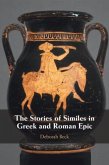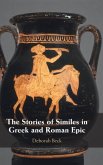Reveals Euripides' ground-breaking use of monody, or solo actor's song, in his late tragedies. Contributing to the current scholarly debate on music, emotion, and characterization in Greek drama, Claire Catenaccio examines the role of monody in the musical design of Ion, Iphigenia among the Taurians, Phoenician Women, and Orestes.
Bitte wählen Sie Ihr Anliegen aus.
Rechnungen
Retourenschein anfordern
Bestellstatus
Storno








